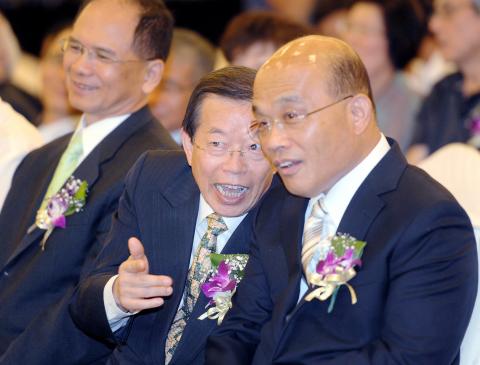Former premier Frank Hsieh (謝長廷) said yesterday that he has accepted an invitation from the International Bartenders Association to visit Beijing next month to watch a world bartending competition there.
Hsieh, an influential member of the Democratic Progressive Party (DPP), said he has informed the association that he is willing to go if the required procedures, including flight and hotel arrangements, can be completed without any glitches.
Saying that “October is a sensitive month” since it is close to when the Chinese Communist Party’s 18th National Congress — in which a leadership changeover is expected — is scheduled to take place, Hsieh added that “for a person like me now may not be the best time to visit. Maybe it will be too much trouble.”

Photo: Lo Pei-der, Taipei Times
Citing the peak travel season of China’s Golden Week holiday, which begins around Oct. 1, Hsieh added there is also the question of flight and hotel availability. The matter is to become more certain in two or three days, he said in response to media inquiries at a tea party held by the DPP celebrating its 26th founding anniversary.
If Hsieh makes the trip, he would be the first former DPP premier to visit China.
Hsieh, who served as premier between May 2005 and January 2006 in former president Chen Shui-bian’s (陳水扁) administration, has long been a devoted supporter of the Kaohsiung-based Bartenders Association. He once traveled to Germany for an international bartending contest to show his support for the Taiwanese competitors.
However, Hsieh’s possible China trip has drawn mixed reactions from his party.
Koo Kwang-ming (辜寬敏), a former presidential adviser and a veteran Taiwan independence advocate, backed the trip, saying Hsieh should have made the trip a long time ago “because China is a very important rival.”
Former DPP Taipei Chapter chairman Huang Ching-lin (黃慶林) said “it is OK to be on friendly terms with China, but not to pay ‘tribute’ at this sensitive moment.”
Former DPP chairman Yao Chia-wen (姚嘉文) also voiced his opposition to the planned visit. As Hsieh had once broached the notion of “constitutional one China (憲法一中),” Yao said he felt uneasy about Hsieh visiting Beijing.
The essence of Hsieh’s concept of “constitutional one China” purported that until the Republic of China (ROC) Constitution is amended, the DPP must acknowledge the ROC Constitution, although it is seriously flawed.
At the DPP anniversary party, Yu Shyi-kun (游錫堃), who also once served as premier during the former DPP administration, said that while he supports increased interaction with China, the party should uphold its core values and should never abandon them simply for improving ties with Beijing.
According to DPP spokesperson Wang Ming-sheng (王閔生), the party has no particular restriction on party members planning trips to China, adding that party regulations stipulate only that members need to give prior notification to party headquarters on their planned China trips.

AIR SUPPORT: The Ministry of National Defense thanked the US for the delivery, adding that it was an indicator of the White House’s commitment to the Taiwan Relations Act Deputy Minister of National Defense Po Horng-huei (柏鴻輝) and Representative to the US Alexander Yui on Friday attended a delivery ceremony for the first of Taiwan’s long-awaited 66 F-16C/D Block 70 jets at a Lockheed Martin Corp factory in Greenville, South Carolina. “We are so proud to be the global home of the F-16 and to support Taiwan’s air defense capabilities,” US Representative William Timmons wrote on X, alongside a photograph of Taiwanese and US officials at the event. The F-16C/D Block 70 jets Taiwan ordered have the same capabilities as aircraft that had been upgraded to F-16Vs. The batch of Lockheed Martin

GRIDLOCK: The National Fire Agency’s Special Search and Rescue team is on standby to travel to the countries to help out with the rescue effort A powerful earthquake rocked Myanmar and neighboring Thailand yesterday, killing at least three people in Bangkok and burying dozens when a high-rise building under construction collapsed. Footage shared on social media from Myanmar’s second-largest city showed widespread destruction, raising fears that many were trapped under the rubble or killed. The magnitude 7.7 earthquake, with an epicenter near Mandalay in Myanmar, struck at midday and was followed by a strong magnitude 6.4 aftershock. The extent of death, injury and destruction — especially in Myanmar, which is embroiled in a civil war and where information is tightly controlled at the best of times —

China's military today said it began joint army, navy and rocket force exercises around Taiwan to "serve as a stern warning and powerful deterrent against Taiwanese independence," calling President William Lai (賴清德) a "parasite." The exercises come after Lai called Beijing a "foreign hostile force" last month. More than 10 Chinese military ships approached close to Taiwan's 24 nautical mile (44.4km) contiguous zone this morning and Taiwan sent its own warships to respond, two senior Taiwanese officials said. Taiwan has not yet detected any live fire by the Chinese military so far, one of the officials said. The drills took place after US Secretary

THUGGISH BEHAVIOR: Encouraging people to report independence supporters is another intimidation tactic that threatens cross-strait peace, the state department said China setting up an online system for reporting “Taiwanese independence” advocates is an “irresponsible and reprehensible” act, a US government spokesperson said on Friday. “China’s call for private individuals to report on alleged ‘persecution or suppression’ by supposed ‘Taiwan independence henchmen and accomplices’ is irresponsible and reprehensible,” an unnamed US Department of State spokesperson told the Central News Agency in an e-mail. The move is part of Beijing’s “intimidation campaign” against Taiwan and its supporters, and is “threatening free speech around the world, destabilizing the Indo-Pacific region, and deliberately eroding the cross-strait status quo,” the spokesperson said. The Chinese Communist Party’s “threats